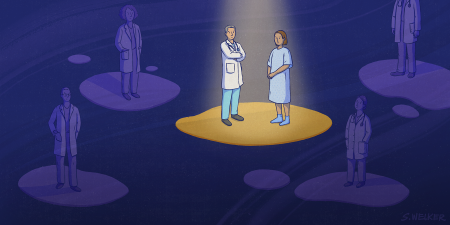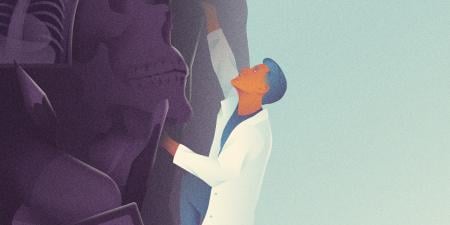A Chinese man in tattered clothing and a snake-like ponytail stands on a pedestal in a harbor. The words “filth,” “immorality,” “diseases,” and “ruin to white labor” radiate from his head. This 1881 reimagination of the Statue of Liberty by cartoonist George Frederick Keller captured the widespread anti-Chinese fear and bigotry of the time.1 Fueled by ignorance and racism, the Chinese Exclusion Act of 1882 became the first law in US history to restrict the immigration of people of a specific racial or ethnic group.2 It was not until 1943 that exclusionary laws against Chinese immigrants were repealed because the United States wanted China as an ally in its war against Japan.2
With arrival of the novel coronavirus disease (COVID-19), fear of and racism against individuals who “look Chinese” have reemerged. Fewer customers are visiting businesses in US Chinatowns; Asians and Asian Americans have been berated and attacked in subways or questioned and refused service at hotels;3 and some people scamper away after a cough or sneeze from those who are ethnically profiled. This is not the first time an illness has sparked panic and xenophobia against a specific group of people.4 Sadly, it likely won’t be the last.
To date, nearly 3000 deaths have been attributed to COVID-19, most of which happened in China; no deaths have been reported in the United States.5 For context, 290 000 to 650 000 people die annually from seasonal influenza worldwide every year,6 and it’s estimated that 16 000 to 41 000 people have already died from influenza in the United States this flu season.7 As we investigate, track, and learn more about this novel coronavirus, relevant and accurate information needs to be disseminated to the public in a timely and effective manner. Health care professionals play essential roles in educating patients and communities, but education is not enough: just ask any physician who has failed to convince a patient to get an influenza vaccination.
In a world of character-limited posts and instantly shared videos, creating and disseminating information—whatever its quality—seems to be in the hands of everyone, and falsehoods online spread faster and farther and seem to penetrate more deeply and pervasively than truths.8 To address this “infodemic,” governments, industry, professions, and the media must work together to contain and counter mis- and disinformation about the novel coronavirus.9 The World Health Organization is currently working with tech and social media titans to remove mis- and disinformation and direct us all to credible resources.10 Enlisting Fortune 500 companies and other large-scale employers is another key part of this truth-telling strategy, as employers tend to be considered trusted sources of information by many members of the public.11 Global callouts by leading scientists and public health experts have condemned conspiracy theories about origins of the novel coronavirus and are notably pushing back against the worst impulses of the human condition that mis- and disinformation campaigns viralize.12
Falsehoods sow division and undermine solidarity in particularly pernicious ways when human cooperation is critical. We cannot afford fear, lies, and hatred to spread faster than the coronavirus because, in our interconnected world, no individual or community is an island. As a coronavirus pandemic appears inevitable, our common resolve to combat a global health threat will no doubt be tested. During these times, we expect and need those in positions of authority to be guided by the best available science, to act with civility and empathy, and to demonstrate leadership that justifies public trust.
Never before had a non-English language film been awarded the Academy Award for best picture. The Oscar-winning film from South Korea poignantly titled Parasite reminds each of us that what makes us laugh, cry, love, and despair is what makes all of us human. As we reckon with the threat and uncertainty posed by the novel coronavirus in the months ahead, let us encourage, celebrate, and vindicate our shared humanity.
References
-
History Teaching Institute, Ohio State University. A statue for our harbor. https://hti.osu.edu/opper/lesson-plans/immigration/images/a-statue-for-our-harbor. Accessed February 27, 2020.
-
Office of the Historian, US Department of State. Chinese immigration and the Chinese Exclusion Acts. https://history.state.gov/milestones/1866-1898/chinese-immigration. Accessed February 27, 2020.
-
Yan H, Chen N, Naresh D. What’s spreading faster than coronavirus in the US? Racist assaults and ignorant attacks against Asians. CNN. https://www.cnn.com/2020/02/20/us/coronavirus-racist-attacks-against-asian-americans/index.html. Updated February 21, 2020. Accessed February 27, 2020.
-
Liu M. The coronavirus and the long history of using diseases to justify xenophobia. Washington Post. February 13, 2020. https://www.washingtonpost.com/nation/2020/02/14/coronavirus-long-history-blaming-the-other-public-health-crises/. Accessed February 27, 2020.
-
World Health Organization. Coronavirus disease 2019 (COVID-2019) situation report-37. https://www.who.int/docs/default-source/coronaviruse/situation-reports/20200226-sitrep-37-covid-19.pdf?sfvrsn=2146841e_2. Published February 26, 2020. Accessed February 27, 2020.
-
World Health Organization. Influenza (seasonal). https://www.who.int/news-room/fact-sheets/detail/influenza-(seasonal). Published November 6, 2018. Accessed February 27, 2020.
-
Centers for Disease Control and Prevention. 2019-2020 US flu season: preliminary burden estimates. https://www.cdc.gov/flu/about/burden/preliminary-in-season-estimates.htm. Reviewed February 21, 2020. Accessed February 26, 2020.
- Vosoughi S, Roy D, Aral S. The spread of true and false news online. Science. 2018;359(6380):1146-1151.
-
Gharib M. Fake facts are flying about coronavirus. Now there’s a plan to debunk them. NPR. February 21, 2020. https://www.npr.org/sections/goatsandsoda/2020/02/21/805287609/theres-a-flood-of-fake-news-about-coronavirus-and-a-plan-to-stop-it. Accessed February 26, 2020.
-
Richtel M. WHO fights a pandemic besides coronavirus: an “infodemic.” New York Times. February 6, 2020. https://www.nytimes.com/2020/02/06/health/coronavirus-misinformation-social-media.html. Accessed February 26, 2020.
-
Edelman. 2019 Edelman Trust Barometer reveals “my employer” is the most trusted institution. https://www.edelman.com/news-awards/2019-edelman-trust-barometer-reveals-my-employer-most-trusted-institution. Published January 20, 2019. Accessed February 26, 2020.
-
Calisher C, Carroll D, Colwell R, et al. Statement in support of the scientists, public health professionals, and medical professionals of China combatting COVID-19. Lancet. February 19, 2020. https://www.thelancet.com/journals/lancet/article/PIIS0140-6736(20)30418-9/fulltext. Accessed February 26, 2020.



